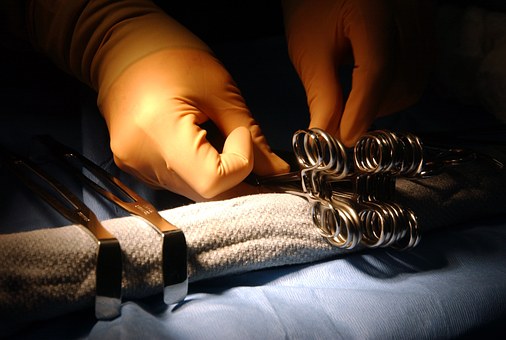Scrub nurses and circulating nurses are involved with the medical care of patients during operations. The nature of their duties differs, however. Read on to learn more about how these careers compare.
Comparing Scrub Nurse to Circulating Nurse
Scrub nurses and circulating nurses are medical professionals who work in the surgical field. Scrub nurses assist surgeons directly and may be actively involved in the operation. Circulating nurses are responsible for ensuring that the operating room is sterile, and their duties involve helping all surgical staff present during the operation.
Education, Salary & Career Outlook
Scrub and circulating nurses work in operating rooms in hospitals. According to the U.S. Bureau of Labor Statistics (BLS), the median salary for hospital nurses was $70,590 as of May 2016. They are required to have training in perioperative nursing, and typically prepare to work in this field of nursing by earning a perioperative certificate after completing a bachelor’s degree in nursing. Registered nurses, including both scrub and circulating nurses, were expected to experience a 16% rate of job growth from 2014 to 2024, per the BLS.
Responsibilities of Scrub Nurse vs Circulating Nurse
Scrub nurses act as an assistant to the surgeons during surgical procedures. They provide hands-on assistance to the surgeons during the operation and perform tasks such as passing them medical equipment. Circulating nurses also specialize in the surgical field, but their focus is on creating and maintaining a sterile working environment. They assist all surgical staff present, including scrub nurses, and are also involved in the assessment of patients before the operation.
Scrub Nurse
Scrub nurses are nurses who primarily work in operating rooms and assist with surgeries. During their studies, it is possible for nurses to specialize in a specific field of medicine, and some may opt to focus on preparing for a career as a scrub nurse, or surgical nurse. As a perioperative nurse, scrub nurses typically need to earn a certificate in that specialty, and for perioperative nurses, this is done after completing a bachelor’s degree in nursing. These nurses primarily work in hospitals or medical facilities that are equipped for surgeries and they must also be licensed.
Job responsibilities of a scrub nurse include:
- Prepare patients for surgery
- Review patient charts and confirm data
- Ensure medical equipment needed for surgery is available
- Follow surgeon’s directions
- Pass medical equipment/s to the surgeon
- Monitor patient’s condition during surgery
Circulating Nurse
Circulating nurses ensure that operating rooms are sterilized and that they remain sterile during procedures. They primarily work in hospital operating rooms, and since they are involved with surgical procedures they can work any time of the day or night. They must have specialized training as a perioperative nurse. Earning a perioperative certificate can be done after completing a bachelor’s degree in nursing. Like all nurses, they are required to have a nursing license in the state they work in.
Job responsibilities of a circulating nurse include:
- Review assessments of patients prior to the operation
- Obtain medical equipment that’s in sterile packaging
- Open the sterile packaging
- Make notes about procedures followed
- Assist all staff present
- Determine how patients will be cared for
Related Careers
If you’re interested in being a scrub nurse and assisting with surgeries you may also want to consider a career as a registered nurse (RN) first assistant, since they specialize in assisting surgeons during operations. If your interest is in working as a circulating nurse you may also be interested in considering a career as an operating room assistant, since they also perform duties to assist surgical staff and keep the operating room sterile.

